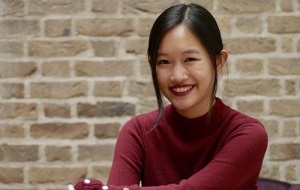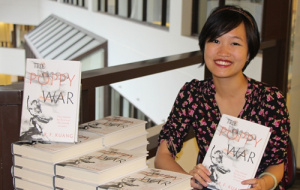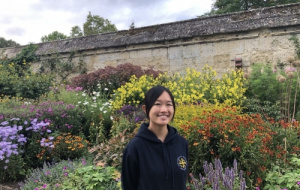Profile: Rebecca Kuang

Rebecca Kuang, (2019, MSc Contemporary Chinese Studies)
Rebecca is studying an MSc in Contemporary Chinese Studies at Univ. She previously studied at Georgetown University and the University of Cambridge. She is a bestselling fantasy author, having won the Compton Crook Award and the Crawford Award as well as being a finalist for the Nebula, Locus, Campbell, and World Fantasy Awards.
Give your specialist subject pitch.
I’m doing an MSc in Contemporary Chinese Studies, specialising in contemporary Chinese literature. Right now I’m researching visions of empire and nationalism in contemporary Chinese science fiction for my dissertation. I did my first Master’s degree at Cambridge in Chinese Studies, where I focused on propaganda fiction written during World War II.
There’s quite a big gap between fiction written in the 1930s and fiction written now, so I appreciate the chance to get extra training in contemporary versus twentieth century Chinese studies. Of course, doing two Master’s before a PhD is a little frivolous, so I wouldn’t have done it if I weren’t fortunate enough to have two years of funding from the Marshall Scholarship. I’m very grateful to have had that opportunity, especially since it has let me experience both sides of Oxbridge.
 Has anything surprised you about Oxford?
Has anything surprised you about Oxford?
I was at Cambridge for a year before I came here, so I’ve adjusted pretty well to life in the UK, and I was ready for the particularities of Oxbridge life – the college system, formal hall, sub fusc, punting, and the ubiquity of pubs was pretty weird to get used to as an American. I’ve actually been surprised by how good the food is here. I think the stereotype is that British food is flavour-less and bad, but I’ve discovered tons of favourite restaurants and cafes. I spend a lot of time at Najar’s and Vaults & Garden. Maybe Cambridge just set low expectations for me…
What are you most proud of?
I’m really proud that I can plank for four minutes straight!
What does a day in your life look like?
On a regular weekday I wake up around seven, head to the gym if I don’t have morning class, and then spend the morning doing course readings, working on translations, or reading the news. I usually have class in the early afternoon, after which I have lunch and then spend a few hours in the library on coursework. I really love working in the Rad Cam, and one of the beauties of living in college is that I can roll out of bed and be there in thirty seconds. My evenings are reserved for writing.

Rebecca with copies of her first book
How has your writing process varied across the books in the trilogy?
My writing process remains chaotic, but I have a better understanding of the ways in which it is chaotic. I can’t write chronologically or from an outline. I’m a “pantser” rather than a “plotter”, meaning I discover what excites me about a scene only when I’m there in the moment. So, in any given writing session I might jot down a few paragraphs from the end, finish a scene in the middle, and fiddle with the opening sentence. This creates really messy first drafts that I then have to go and revise carefully for it all to make sense. It helps to know going in that my books really “happen” in the later drafts–that’s when the writing gets pretty, when the plot becomes intricate instead of messy, and when the characterisation is fully developed. It took me a few books to realise this about myself, and now that I understand my own process, I’m less anxious about writing very bad first drafts.
 Does your research inform your fiction? How does academic writing and fiction writing differ?
Does your research inform your fiction? How does academic writing and fiction writing differ?
My studies and my books are very much intertwined. I always end up writing about whatever I’m studying at the moment. In undergrad and at Cambridge, that was twentieth-century Chinese history. Now my interests are turning towards contemporary student revolution moments, so that will inform my fourth book.
I think writing fiction is so much easier. In academic writing, you can’t make stuff up.
You can follow Rebecca on Twitter and buy the first two books in The Poppy War trilogy at Blackwell’s.
Published: 21 January 2020
